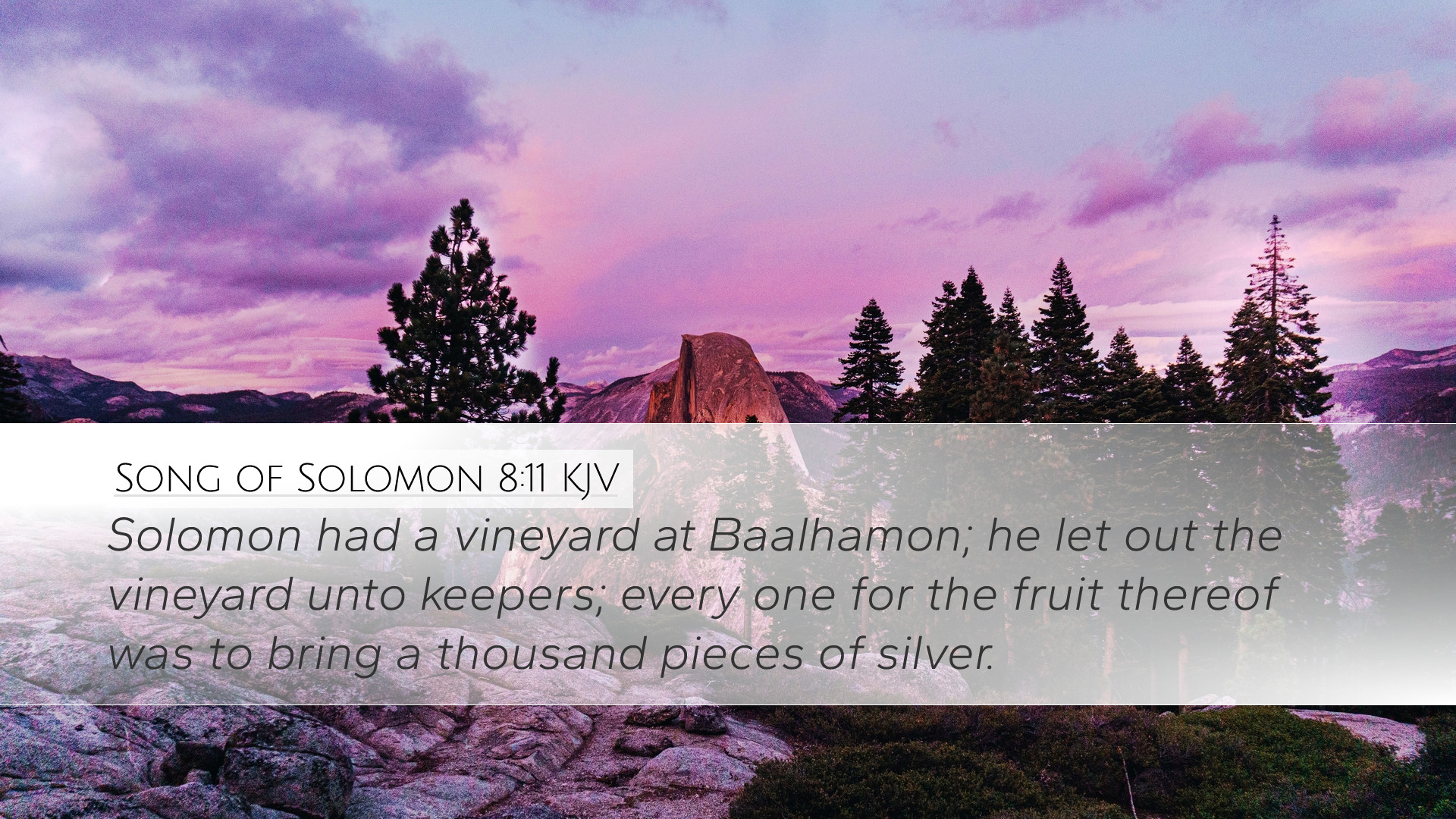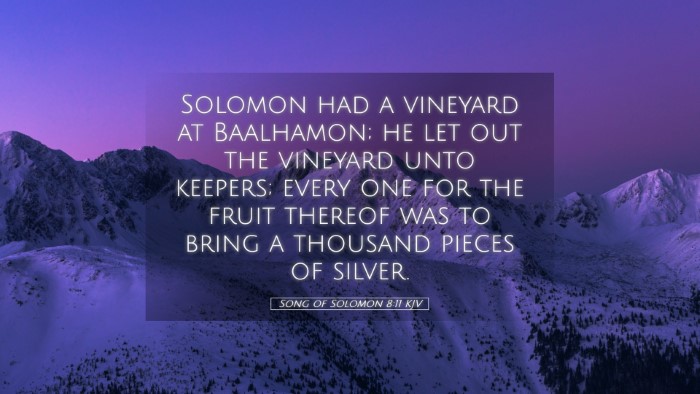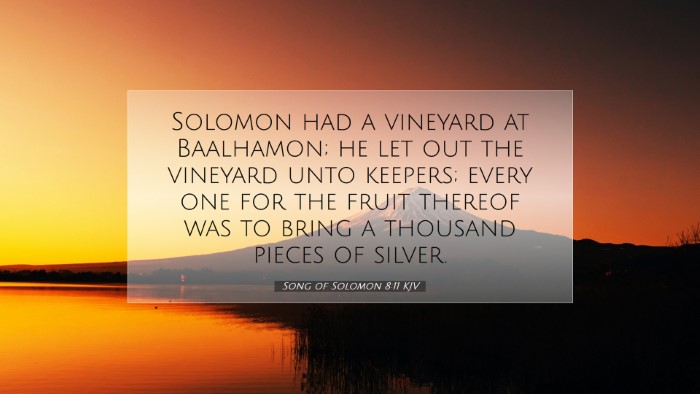Old Testament
Genesis Exodus Leviticus Numbers Deuteronomy Joshua Judges Ruth 1 Samuel 2 Samuel 1 Kings 2 Kings 1 Chronicles 2 Chronicles Ezra Nehemiah Esther Job Psalms Proverbs Ecclesiastes Song of Solomon Isaiah Jeremiah Lamentations Ezekiel Daniel Hosea Joel Amos Obadiah Jonah Micah Nahum Habakkuk Zephaniah Haggai Zechariah MalachiSong of Solomon 8:11
Song of Solomon 8:11 KJV
Solomon had a vineyard at Baalhamon; he let out the vineyard unto keepers; every one for the fruit thereof was to bring a thousand pieces of silver.
Song of Solomon 8:11 Bible Commentary
Exegesis and Commentary on Song of Solomon 8:11
Bible Verse: "Solomon had a vineyard at Baal-hamon; he let out the vineyard unto keepers; every one for the fruit thereof was to bring a thousand pieces of silver." (Song of Solomon 8:11, KJV)
Introduction
The Song of Solomon, also referred to as the Song of Songs, is a poetic text rich in metaphoric language and profound themes of love, desire, and relational intimacy. Verse 8:11 offers insight into the economic and relational dynamics within love and commitment, serving as a springboard for deeper theological reflection.
Verse Analysis
Literal Interpretation
This verse presents Solomon, the emblematic figure of wisdom and wealth, as the owner of a vineyard, which he entrusts to keepers. Each keeper is responsible for producing fruit in exchange for a thousand pieces of silver. On the surface, this illustrates a transaction rooted in gain, yet it is layered with symbolic meaning.
Theological Implications
- Ownership and Stewardship: Solomon’s vineyard symbolizes the preciousness of love and relational commitments, suggesting that love requires stewardship and care.
- Value of Relationships: The “thousand pieces of silver” mirrors the intrinsic value placed on love and intimacy; it is not merely an economic transaction but a reflection of the heart’s yearning.
- Shared Responsibility: The keepers represent those entrusted with nurturing and cultivating love; relationships thrive through mutual effort and dedication.
Commentary Insights
Matthew Henry's Commentary
Matthew Henry emphasizes the metaphorical significance of the vineyard. He notes that a vineyard, particularly in the biblical context, often represents a place of delight and abundance in the relationship between God and His people. Here, it suggests that love is cultivated like a garden, necessitating diligence and careful management to yield the desired fruits of joy and fulfillment.
Albert Barnes' Commentary
Albert Barnes elaborates on the economic imagery used in this passage. He posits that the “keepers” of Solomon's vineyard can be interpreted as those in positions of authority, including parents or guardians who oversee relationships. The idea of a monetary return illustrates the expectation that love and relationships should yield tangible blessings, reiterating that love is both a gift and a responsibility.
Adam Clarke's Commentary
Adam Clarke reflects on the multiplicity of interpretations this verse holds, particularly in how it celebrates both the sensual and spiritual dimensions of love. He posits that the reference to silver symbolizes purity and value, emphasizing that true love is not just an emotional experience but an enduring commitment that entails sacrifice and investment.
Practical Applications
- For Pastors: This verse serves as a powerful reminder to guide congregants in the understanding of love as a cultivated act that requires stewardship. Teachings can be derived on nurturing both romantic and familial relationships.
- For Students: Reflect on the blend of economics and emotion in relationships. Engage in discussions regarding how love can be viewed through various lenses and its implications for personal life and community engagement.
- For Theologians: Explore the theological significance of stewardship in relationships, considering how this divine metaphor aligns with the broader narrative of scripture that equates love with commitment and faithfulness.
- For Bible Scholars: Analyze the historical context of the Song of Solomon, its authorship, and the interplay of literary devices that convey deeper meanings associated with love, desire, and relational fidelity.
Conclusion
Song of Solomon 8:11 serves not merely as a depiction of economic exchange but as a profound commentary on the stewardship of love. It invites readers to reflect on the deeper implications of relational commitment, calling attention to the efforts required to nurture, sustain, and cherish one another in a world that often undervalues the depth of authentic love.


